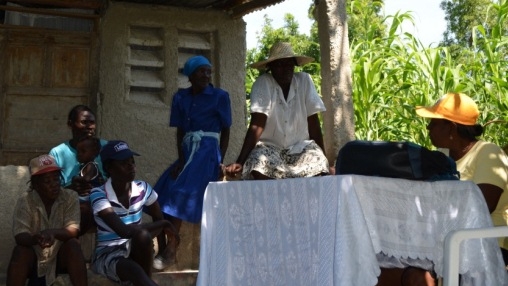Challenge
Access to basic social services is very limited in Haiti. The absence of financial resources and lack of coordination by Government has left non-state actors, such as NGOs and faith-based organizations, as the sole providers of essential social services in most of the country. As a result, social interventions in Haiti are fragmented, underfunded, and uncoordinated, limiting real impact on the poor.
Families living in remote rural areas lack access to essential services such as water and sanitation, health services, quality education for their children, and income-generating opportunities. Forty percent of the population does not have access to an improved water source, 80 percent have no access to sanitation facilities, and 40 percent of the population lack access to healthcare services. Many Haitians also suffer from poor hygiene practices, malnutrition, and food insecurity. More than one in five children under-five is chronically malnourished and 65 percent of children under 5 suffer from anemia, which interferes with normal brain development and learning. This context has perpetuated the vicious cycle of poverty in rural Haiti. Ensuring access for the poor and most vulnerable to basic social services is critical to Haiti’s long term development.
Solution
To break the vicious cycle of poverty, the Government of Haiti is implementing the Kore Fanmi initiative, which is “family coaching” in Haitian Creole. This approach aims to improve access and efficiency of social service delivery in rural areas of Haiti by providing:
- Family coaching using multisectoral community agents to work directly with families, providing basic services, including behavior change counseling, nutrition supplements, and vaccinations, and linking families to existing services.
- A tailored family development plan, created based on a socio-economic survey that captures a family’s particular vulnerability.
- A dynamic and integrated information management system, which analyzes each individual family’s conditions and vulnerabilities, proposes key actions to be undertaken, and tracks progress over time.
- An “Opportunity Map,” an inventory of services available to the population through various service providers in the target area, which is used for referral.
Kore Fanmi seeks to lay the foundation in Haiti for a cost-effective and sustainable social protection operational strategy by providing a common platform to coordinate social interventions by all service providers at the local level.
Results
- Currently, Kore Fanmi reaches 65,000 people (13,000 families) in 3 rural communes in the Center department in Haiti.
- 150 multisectoral community agents have been recruited and trained.
- Initial results for one of the three communes: Over 3,000 vaccinations to children under 5; more than 30,000 people participated in community meetings or received home visits by community agents; and over 800 life-saving commodities such as soap, water treatment, oral rehydration salts, micronutrients, and mosquito nets have been distributed to poor and vulnerable families.
Bank Group Contribution
The World Bank piloted this approach through a US$3 million contribution from the multi-donor Rapid Social Response Trust Fund, which is being scaled up through an IDA grant of US$18 million in the Improving Maternal and Child Health through Integrated Social Services Project. IDA will finance the expansion of Kore Fanmi in three departments of the country over the next five years.
Partners
The World Bank, the UN Agencies, and Fonds d’Assistance Economique et Sociale, the implementing agency, have established a dialogue to work more closely and coordinate actions in this sector. UN Agencies are investing in Kore Fanmi as an effective mechanism to facilitate synergies among their programs, identify families in need of specific interventions, and reach the poorest of the poor. Kore Fanmi is the main pillar of UNICEF’s 2013-2016 operational strategy. In addition, a partnership agreement has been signed with UNICEF and the World Food Program on collaboration to provide a set of essential health and nutrition commodities, technical assistance, and problem solving for Kore Fanmi. The USAID-supported national food security program will also use the Kore Fanmi initiative to identify, target, and monitor food insecure families.
Beneficiaries
Kore Fanmi reaches 13,000 families (65,000 vulnerable people), who had limited access to life-saving services and information, creating hope for a better future. With IDA support, Kore Fanmi will be scaled up over the next five years to reach over 400,000 people.

